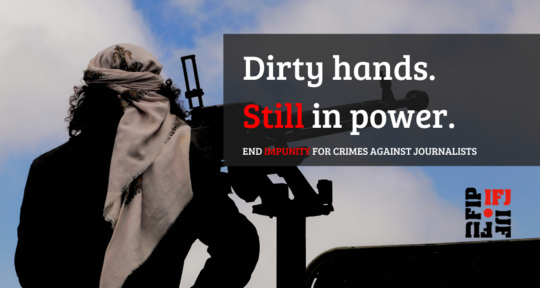Forty-four journalists were killed in Yemen between 2010 and September 2020, many of whom lost their lives since the outbreak of fighting between the Abdrabbuh Mansur Hadi-led Yemeni government supported by the Saudi-led coalition and the Houthis armed movement. According to the Yemeni Journalists Syndicate (YJS), none of the perpetrators has been brought to justice.
The bloody conflict, political instability, the multiplicity of actors in the absence of state authority, but also the growing hostility towards the press and journalists have contributed to enshrining the impunity of the perpetrators of these crimes.
Most of the perpetrators are involved in the ongoing war in Yemen, which started in 2015. The situation of impunity is fostered by the absence of an independent judiciary and inadequate security conditions.
In addition to the killings, Yemeni media workers suffer arbitrary detentions, injuries and threats on a daily basis. They often face media restrictions or closures and self-censorship out of fear of reprisals. They are regularly prevented from covering news and face the suspension of their salaries. Yemeni media has become highly polarised along political and sectarian lines and media professionals are considered by the warring factions as the enemy.
The war in Yemen is often considered as a “forgotten war”, because of the little coverage on the conflict by international media due to attempts to silence independent reporting , which has resulted in a news deficit.
While many journalists fled the country, some continue to remind the world of the havok which the conflict continues to exact on the civilians. Sometimes, the price for informing the public about the current situation and the suffering of the people has been the loss of journalists' lives.
However, the most vulnerable group are local journalists, who are more likely to face the dangers of reporting the war.
2020: a difficult year for Yemeni journalists
The latest YJS' report on the state of media freedom in the country lists 88 attacks against journalists and media from January to the end of September 2020. The crimes range from targeted killings, imprisonment, attacks on media houses, shutdown of media and confiscation of newspapers to death threats, harassment and assaults.
Most of these violations were committed by the armed groups and states involved in the war. The YJS cites both Yemen’s internationally recognised government of President Hadi and the Houthis, who lead the de facto government in Sana'a, as those mainly responsible for the attacks against media workers this year.
So far in 2020, the IFJ has recorded the killing of two journalists in the country. Cameraman Badil Al-Buraihi was killed on 18 January in a bombing carried out by the Houthi group, and on 2 June, AFP photojournalist Nabil Al-Qaiti was assaulted and murdered by unidentified men outside his home because of his journalistic activities.
This is the same number of journalists killed during 2019. Journalist Ziyad Al-Sharabi, was killed on 29 January 2019 in a motorbike explosion when he was on a journalistic mission. The Houthis were suspected in connection with this attack. Photographer Ghaleb Blhch was killed in May 2019 after being targeted by the same group.
Overall, from 2010 to the end of September 2020, 44 journalists have lost their life in Yemen.
In addition to the reported killings, 20 journalists are still missing, after being kidnapped while four journalists have been sentenced to death on charges of "treason and spying for foreign states" in arbitrary trials.
“We do not forget the responsibility (especially moral) of successive governments for not identifying the perpetrators of these crimes in order to judge them. Unfortunately, they have not responded to our continuous calls for concrete action to prosecute and punish the criminals. Indeed, we note that violations continue to multiply and in 2020 only, we have counted nearly 100 violations of press freedom in the country. We will continue to demand the rejection of the state of impunity and we call on all organizations concerned with freedom of expression to support this approach so that the perpetrators of press violations are prosecuted,” said Mohammed Shubaita, YJS General Secretary.
The IFJ believes that none of these crimes can go unpunished and praises the work of its affiliate, whose monitoring and reporting over the situation of media workers’ in Yemen is essential in the seek of justice.

